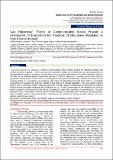Can Habermas' Theory of Communicative Action Provide a Framework of Inspiration for Practices of Discursive Mediation in Post-Election Kenya?

View/
Publication Date
2019Author
Philip Visendi Lumwamu, Florence Ngesa Indede, Peter Maina Matu
Metadata
Show full item recordAbstract/
This article examines how Habermas‘s theory of communicative action provides insights for mediation processes and conflict resolution in general. It lays its assumptions that people in society are in relationship and that presuppositions of argumentation proposed by Habermas can assist direct focus on fundamental elements of conflict resolution. Kenya in the wake of the violently disputed presidential elections of 2007 is undergoing a transition period where both the perpetrators and the victims of the violence are seeking justice and reparation respectively. Inherent in the process is the emerging debate on reconciliation and retribution. The failure of International Criminal Court (ICC) to successfully prosecute the six suspects who had been indicted to face charges of criminal culpability in the post-election violence builds a case for alternative conflict resolution approaches. The paper adopts a methodology that discusses the mediation process through conceptual metaphors used in reference to ICC. A closer interpretation of the metaphors can assist the parties to prepare a resolution process that derives from Habermas ideas of the ‗conditions of communication‘. This paper proposes the use of these ideas to constrain abuses of their authority, and ultimately offer mediators a new opportunity to help re-establish positive relationships thereby contributing to the post-election violence transition debate in the post-election violent Kenyan society.
